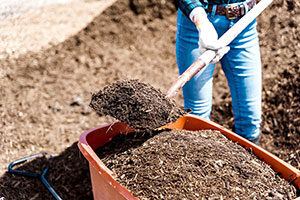(The opinions and views expressed in the commentaries and letters to the Editor of The Somerville Times belong solely to the authors and do not reflect the views or opinions of The Somerville Times, its staff or publishers)

By Jonathan Monderer
We live in a world where food is accessible as ever, where we can get fruits and vegetables and other groceries from all over the world. Not until volunteering at a farm a couple of years ago did I truly realize the disconnect we have from the food we eat and the amount of energy and resources it takes to grow something.
I believe this disconnect has led many of us to not think twice about throwing food scraps away into the trash. Upon seeing firsthand how much energy it takes to grow food, I realized that we are wasting so much potential by throwing food out. To illustrate this point, in the US, only 4.1% of food waste is composted annually. That translates to 2.6 million tons of food (EPA).
The majority of waste food in the US is thrown away in landfills, which is a huge problem because organic material in these landfills decomposes and releases methane into the atmosphere. Methane is a greenhouse gas that’s 72 times more potent than carbon dioxide – therefore, food waste is not only a huge waste of resources but also a major contribution to greenhouse gas emissions and climate change.
Wanting to make a difference and reduce my carbon footprint, a few months ago I signed my apartment up for the Garbage to Garden composting service at the Davis Square Farmers Market (which has been great so far). I put my scraps in a bin every week, and they come and take it on the same day as I put out my trash. What’s amazing is that they even take meat scraps, something that one cannot compost in home compost.
I also know that Somerville has a big problem with rats and I’m sure people putting food scraps in their trash bin does not help with that problem. Having a compost bin has lessened my household’s weekly waste stream, eliminated odors in the trash bin in the house, and made me feel better about making a positive impact in my day-to-day lifestyle.
To illustrate the impact of household composting, if eight households in the US composted food scraps, it would offset an average household’s electricity use annually. Apart from energy compensation, other composting benefits include protecting watersheds and improving soil health by recycling nutrients back into the ground for added nutrients and water retention (WCEE).
I encourage all residents to at least try out a month of curbside composting with Garbage to Garden considering how easy it is to partake in and make a positive impact. I also hope/strongly encourage the city of Somerville to institute free composting for residents in the future to help alleviate problems with rats in the city and provide individuals with ways to make a quantifiable impact.















Reader Comments